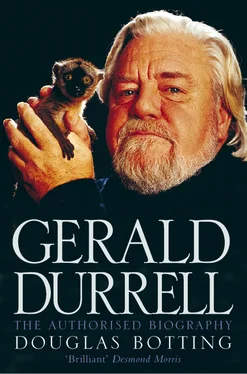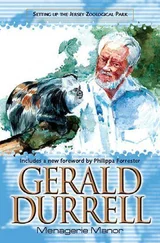At last, in May 1945, the guns in Europe fell silent. Gerald’s obligation to contribute to the war effort came to an end, and within a few weeks he had taken his first step towards his true life goal. By his own account he had long ago – as far back as Corfu, even – worked out what he wanted to do in life. First he would travel the world collecting animals for zoos, then he would establish a zoo of his own. Both objectives were highly unusual and extraordinarily difficult, and both required an expertise he did not possess in 1945. ‘I realised,’ he was to record later, ‘that if I wanted to achieve my ambitions, it was necessary for me to have experience with creatures larger than scorpions and sea horses.’ There seemed to be only one thing he could do – get a job in a zoo.
Having decided this, I sat down and wrote what seemed to me an extremely humble letter to the Zoological Society of London, which, in spite of the war, still maintained the largest collection of living creatures on one spot. Blissfully unaware of the enormity of my ambition, I outlined my plans for the future, hinted that I was just the sort of person they had always been longing to employ, and more or less asked them on what day I should take up my duties.
Normally, such a letter as this would have ended up where it deserved – in the waste-paper basket. But my luck was in, for it arrived on the desk of a most kindly and civilised man, one Geoffrey Vevers, the Superintendent of the London Zoo. I suppose something about the sheer audacity of my letter must have intrigued him for, to my delight, he wrote and asked me to attend an interview in London. At the interview, spurred on by Geoffrey Vevers’ gentle charm, I prattled on interminably about animals, animal collecting and my own zoo. A lesser man would have crushed my enthusiasm by pointing out the wild impracticability of my schemes but Vevers listened with great patience and tact, commended my line of approach to the problem, and said he would give the matter of my future some thought. I left him even more enthusiastic than before.
A few weeks later Gerald received a courteous letter informing him that unfortunately there were no vacancies for junior staff at London Zoo, but if he wished he could have a position as relief keeper at Whipsnade, the Zoological Society’s country zoo.
As a relief keeper, Gerald would be the lowest of the low. But since he was clearly a special case, and not at all typical of the usual recruit to the ranks of zoo keepers, Geoffrey Vevers thought up the grandiose title of ‘student keeper’ for him. ‘If he had written offering me a breeding pair of snow leopards,’ Gerald recalled, ‘I could not have been more delighted.’
A few days later – ‘wildly excited’ – Gerald set off for Whipsnade. He had two suitcases with him, one full of old clothes, the other containing natural history books and many fat notebooks in which he intended to jot down everything he observed of his animal charges and everything he learnt from his fellow keepers. On 30 July 1945 he began his lifelong involvement with zoos. If his adolescent reading had provided his secondary education, Whipsnade was to be his university.
*Red Data Books, regularly compiled by the International Union for the Conservation of Nature and Natural Resources (IUCN), list all known endangered or extinct species worldwide.
SIX Odd-Beast Boy Whipsnade 1945–1946
Gerald’s first port of call at Whipsnade was the office of the zoo’s superintendent, Captain William Beal, a former army veterinary officer from the Gold Coast (now Ghana). Gerald found him sitting behind a large desk in his shirtsleeves, sporting handsome striped braces:
As the captain stood up, I saw that he was a man of immense height and girth. He came lumbering round the desk and stared at me, breathing heavily through his nose.
‘Durrell?’ he boomed interrogatively. ‘Durrell?’
He had a deep voice and he spoke in a sort of muted roar.
‘Think you’ll like it here?’ asked Captain Beal so suddenly and so loudly that I jumped.
‘Er … yes, sir, I’m sure I shall,’ I said.
‘You’ve never done any of this sort of work before?’
‘No, sir,’ I replied, ‘but I’ve kept a lot of animals at one time or another.’
‘Ha!’ he said, almost sneeringly. ‘Guinea pigs, rabbits, goldfish – that sort of thing. Well, you’ll find it a bit different here.’
Shortly afterwards, Gerald was told he was to start work straight away next morning – on the lions.
Whipsnade village, Gerald discovered, was a tiny place with one pub and a handful of cottages scattered among valleys full of hazel copses. His digs turned out to be an oak-beamed room in one of the cottages, the bee-loud, flower-bowered home of Charlie Bailey, who worked with the elephants up at the zoo, and his wife. Gerald was a rather surprising lodger for this modest couple, for with his upper-class accent and sophisticated ways he was more like a toff than a lowly trainee keeper.
‘What made you come to Whipsnade, Gerry?’ asked Charlie, not unreasonably, over a huge supper of country fare.
‘Well,’ Gerald replied, ‘I’ve always been interested in animals, and I want to become an animal collector – you know, go out to Africa and places like that and bring back animals for zoos. I want to get experience with some of the bigger things. You know, you can’t keep big things down in Bournemouth. I mean, you can’t have a herd of deer in a suburban garden, can you?’
‘Ah,’ Charlie agreed. ‘No, I see that.’
Eventually, stuffed with food, Gerald made his way up to his room. ‘I climbed into bed,’ he recalled, ‘and heaved a great sigh of triumph. I had arrived. I was here at Whipsnade. Gloating over this thought I fell asleep.’
He could not have been more fortunate in his place of work experience, for Whipsnade was a very special kind of zoo. Occupying five hundred acres of a former farm estate perched high on the Dunstable Downs in Bedfordshire, thirty-five miles north-west of London, Whipsnade had been opened in 1931. From the outset it had been conceived as a country zoo park – the first public one in Britain – where all the animals could, as far as possible, live in natural surroundings instead of in the barren and insanitary cages that were their lot in most of the zoos around the globe. The idea was not new: the great German animal dealer Carl Hagenbeck had created the first modern zoological garden in Hamburg back in the middle of the nineteenth century. But Whipsnade went far beyond the confines of the zoological garden. As an open-plan zoo park, lions and tigers could roam through Whipsnade’s dells, zebra and antelope could graze freely in the great rolling paddocks, and wolves could wander in a pack through the woods. Gerald noted that it was ‘the nearest approach to going on safari that one could attempt at that time’.
But the purpose of Whipsnade was not simply to display animals to the public in ideal surroundings. It was also intended as a place for preserving some of the world’s dwindling natural resource of wild animals, and it soon became internationally renowned for its success in the captive breeding of endangered species, from the nearly extinct white Chartley cattle and Przewalski’s Mongolian wild horse to the American bison, the musk ox and Père David’s deer. With unerring good fortune, Gerald Durrell had pitched up at a more than passable combination zoo and propagation centre, not perhaps up to the standards of the San Diego Wild Animal Park or New York’s World of Birds, but doing its best to cope in wartime. Its influence on his future life and career was to prove immeasurable.
Jill Johnson, an eighteen-year-old girl who looked after the huskies and Shetland ponies at the zoo, remembered encountering Gerald on his first working morning at Whipsnade. ‘I was called down to meet a new boy,’ she recalled:
Читать дальше










